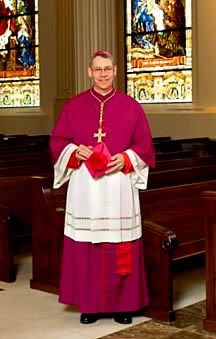|
Opus Disruption in KC-St. Joe (The Catholic Right: Sixteenth in a Series)
Within a year of his installation, Archbishop Finn unceremoniously fired the diocese's chancellor, a layman of 21 years of service in the diocese, along with his vice chancellor, whom the National Catholic Reporter described as "...a religious woman stationed in the diocese for nearly 40 years and the chief of pastoral planning for the diocese since 1990." Both were replaced with a single priest chancellor.(i) Finn's personal political views have also come to predominate various diocesan decisions and pronouncements. Biological issues now take precedence over long-standing concerns such as distributive justice. As Dennis Coday reported in the National Catholic Reporter, A Respect Life Office was established to handle pro-life issues and battle stem-cell research. The effect of this decision was immediately felt in the recent battle over the Missouri's Amendment 2 stem cell ballot initiative which narrowly prevailed on November 7, 2006. In his march backwards he has elevated the role of The Institute of Christ the King Sovereign Priest. This society of priests celebrates Mass in Latin exclusively in its traditional as promulgated before the Vatican II aggiornomento reforms. The Institute has as its stated aim the defense and propagation of Magisterium in all areas of human life, both private and social. Such an attitude is a clear rebuke to Vatican II's reform doctrine as defined in Dignitatis Humanae which declared that while the Church still viewed itself as the vessel of "the truth," it wisely concluded that individuals must be free to seek the truth without coercion. He is not tolerant of dissent and personally censors articles that appear in diocesan publications. To that end, he has ordered the editor of the diocesan newspaper to immediately cease publishing columns by the progressive Notre Dame theologian Fr. Richard McBrien. He also announced that he would review all page one stories, opinion pieces, columns and editorials before publication. This behavior is consistent with Opus Dei's own internal practice of discouraging free thought through censorship. The lay group maintains a list of "forbidden" books, it does not want its members to read. It is a list that includes Enlightenment writers such as Locke, Rousseau and Voltaire. Such policy is indicative of a distrust of reason. And nowhere is this played out in archbishop's universe than in the ongoing debate between the Jesuits and Opus Dei. As I pointed out in the last installment of this series, the Jesuits generally believe that faith and reason can be reconciled. They are also more tolerant of dissent. Such attitudes are the antithesis of many on the Catholic Right. Dennis Coday noted in his NCR piece, "the diocesan-sponsored master's program, administered for eight years by the Aquinas Institute of Theology, a Dominican school affiliated with Jesuit-run St. Louis University, was transferred to the Institute for Pastoral Theology at Florida-based Ave Maria University. Ave Maria is being developed by former Domino's Pizza magnate, Thomas Monaghan who has funded a host of conservative Catholic efforts." (ii) Right in the middle of the American Heartland reigns a leader of the Catholic Church who fears reasoned dissent. This fear of new ideas, and of difference, discussion and debate, speaks volumes of his disdain for liberal democracy as it has been practiced here for over two hundred and thirty years. As a May 12, 2006 NCR editorial duly noted "Such things cannot be exercised by fiat; people can't be made to become a faithful community by controlling them. The qualities of true leadership and authority accrue to those who have a deep empathy for the people they serve; who understand in profoundly human ways their hopes and aspirations as a people of God; who place compassion above the need to dominate; and who understand that relationships, not rules or rubrics or even revered devotions, are the essential thread of the fabric of a community living out the Gospel." As with so much of its reporting on this disruptive prince of the Church, NCR has hit the nail squarely on the head. But whether it is fighting embryonic stem cell research in a pluralistic society or taking on dissenting Catholics or Jesuits who can reconcile faith and reason Archbishop Finn's real enemy is modernity. And for Finn and those of similar thought modernity is synonymous with Liberalism--the very concept they disproportionately blame for alienation, excess commercialism and apostasy. It is an argument that has been made by royalist reactionaries since Joseph DeMaistre. In many ways it is a scream of protest against a changing world. But the archbishop's scream is misplaced. It is only directed at those who understand that change inevitable, but wish to make it more humane. Unfortunately, the Archbishop Robert Finns of the word choose to ignore the truer agents of societal decay and apostasy--an increasingly orthodox faith that becomes more elitist, harsh and out of touch. And why? Simply because that leadership would rather consult with the likes of wealthy men such as Tom Monaghan and William Simon Jr. instead of people who might be their employees. It is elitism at its worst. Beyond that, it is religious philosophy that seems quite out of step with its Founder's intentions. After all, didn't He make those on the margins the focus of His ministry?
Notes:
The Catholic Right: A Series, by Frank Cocozzelli : Part One Part Two Part Three Part Four Part Five Part Six Intermezzo Part Eight Part Nine Part Ten Part Eleven Part Twelve Part Thirteen Part Fourteen Second Intermezzo
Opus Disruption in KC-St. Joe (The Catholic Right: Sixteenth in a Series) | 86 comments (86 topical, 0 hidden)
Opus Disruption in KC-St. Joe (The Catholic Right: Sixteenth in a Series) | 86 comments (86 topical, 0 hidden)
|
||||||||||||
| ||||||||||||




 print page
print page